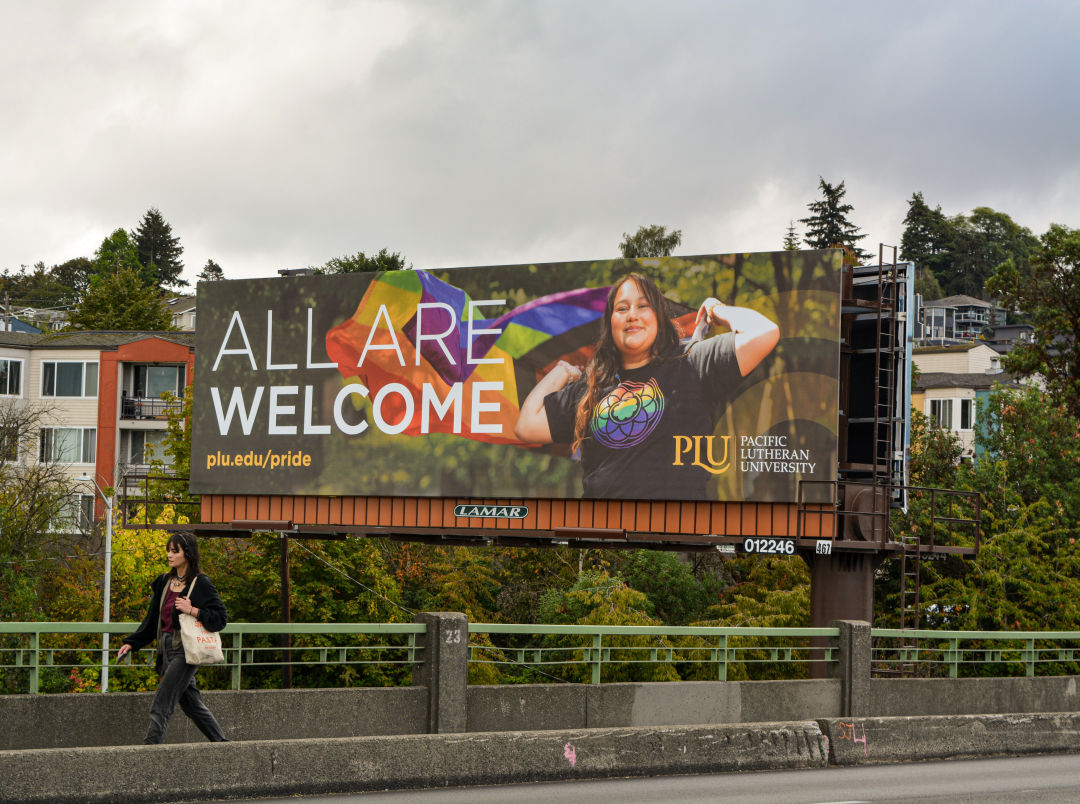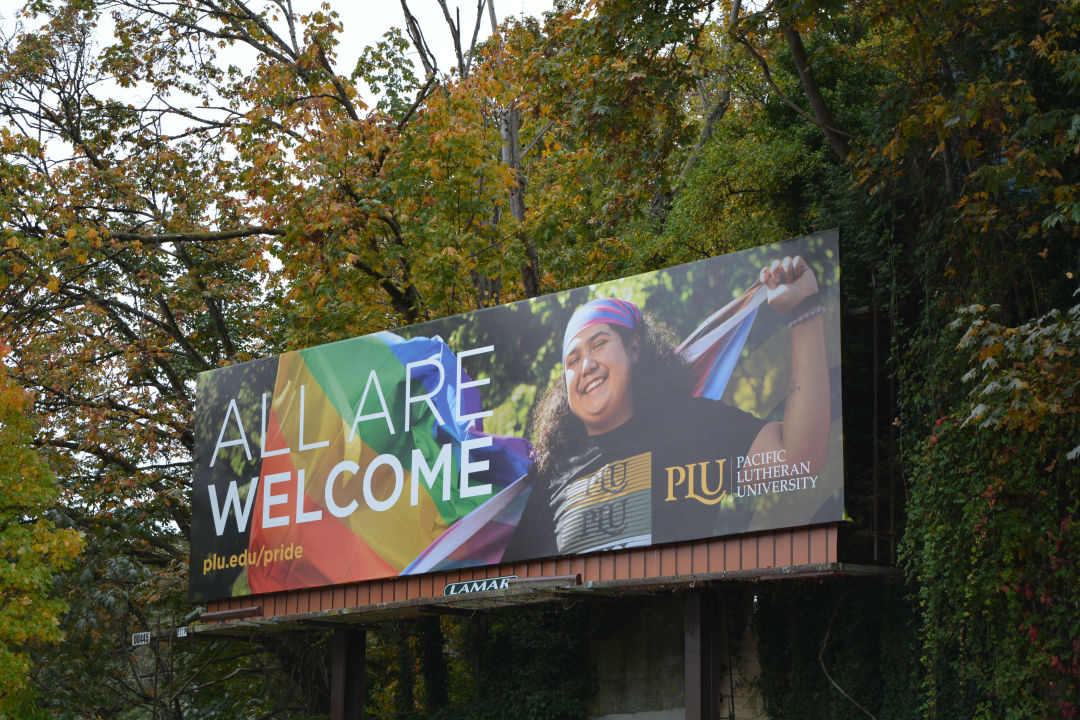
Pacific Lutheran College deliberately focused the world round Seattle Pacific College for its satisfaction billboards.
On the southwestern finish of the Fremont Bridge—nestled into Queen Anne’s steep northern slope the place Lake Union flows into the Ship Canal—there’s a brand new, if considerably ephemeral, sight to behold: a rainbow-colored billboard from Pacific Lutheran College.
The billboard popped up in September and reveals a smiling scholar sporting a multicolored college T-shirt; they’re holding a satisfaction flag over their shoulders, which billows earlier than a woodsy background. “ALL ARE WELCOME,” the billboard exclaims, inviting passersby to be taught extra in regards to the Tacoma-based college by way of its web site.
Those that discover it—regardless of the frenzy of the Fremont Bridge’s southern intersection and the brazen norm to drive by way of it at 40mph—would possibly assume this oversize Satisfaction poster is nothing greater than an analog overture to native excessive schoolers throughout admissions season. Nevertheless it’s really a part of a focused marketing campaign, which started final fall and has since intermittently straddled every east-west excessive of North Queen Anne. That’s an hour’s drive from PLU’s campus. However proper subsequent door to a different one.
Seattle Pacific College is an area, personal, Christian establishment of upper studying very similar to PLU—save for its specific insurance policies towards using brazenly LGBTQ+-identifying college and workers, a extremely controversial (and legally contentious) apply the college’s board reaffirmed in 2022 to “stay in communion with its founding [Free Methodist] denomination.”
A ready assertion for Seattle Met from PLU president Allan Belton suggests the billboards’ location is intentional and a multipronged ploy: an admissions technique, positive, but in addition a theological dissent, a pedagogical intervention, and a type of queer-affirming activism.
“PLU launched this marketing campaign as a result of we consider faith-based establishments of upper schooling ought to take the lead in welcoming everybody,” Belton says. “By putting billboards in North Queen Anne, we’re proud to ask all individuals of goodwill to hitch us as college students, college, workers, and neighborhood companions… And if the billboards encourage different establishments and people to change into extra welcoming, they are going to have been effectively well worth the funding.”

PLU started utilizing the “All Are Welcome” slogan earlier than the billboard marketing campaign.
Personal schools and universities throughout the USA have weathered a gradual admissions disaster in addition to downstream budgetary challenges because the Nice Recession. Declining start charges, altering immigration insurance policies, and a shifting financial panorama all contributed to a 15 p.c decline in postsecondary enrollment between 2010 and 2021.
These bigger developments have affected PLU and SPU to differing levels. Pacific Lutheran has 2,600 enrolled college students, down from 3,018 in 2014. Anticipating additional demographic declines, the college has mounted four-year tuition prices, expanded monetary help, and established automated acceptance frameworks with 40 regional faculty districts. The college has additionally used billboards to promote its mounted tuition assure and promote different campus values. Its enrollment has stabilized since 2020.
In 2014, Seattle Pacific College’s undergraduate neighborhood numbered round 3,200 college students; by 2023 that determine was barely above 2,100. In a ready assertion, Seattle Pacific College instructed Seattle Met that the college “welcomed some of the numerous lessons in our historical past when 500 new college students arrived this month, together with greater than 45 p.c of scholars being the primary of their household to attend a university or college.”
Enrollment figures are up, however don’t counsel a rebound from precipitous declines in enrollment that college students, alumni, and admissions workers explicitly tie to the college’s anti-LGBTQ+ hiring insurance policies. SPU’s highest management place centered on variety and inclusion has additionally remained vacant for 2 years; the college’s first and solely administrator in that position, Dr. Sandra Mayo, resigned in Could 2022 after SPU’s board reaffirmed its hiring insurance policies.
“The aim proper now for SPU’s administration is to type of buckle down and decide to the bit,” says Carrie Cox, who beforehand served because the treasurer of Haven, SPU’s official membership for LGBTQ+ college students and allies. Cox additionally led the college’s scholar authorities as its president, and took part in SPU’s presidential search committee; she graduated from SPU in June 2024 and now research utilized physics as a Grasp’s scholar at Stony Brook College in New York.
Following the SPU board’s reaffirmation of its anti-LGBTQ+ hiring insurance policies in Could 2022, the chair of the board, six different trustees, and the college’s president resigned or didn’t renew their phrases. SPU has additionally sued Washington Legal professional Basic Bob Ferguson for investigating SPU’s employment practices; settled a lawsuit introduced towards it by nursing professor Jeaux Rinedahl, who had sued the college in 2021 for discrimination, alleging he was denied a full-time college place on account of his sexual orientation; and settled one other lawsuit by 16 college students, college and workers, who accused SPU management of breaching fiduciary obligation. In June 2023, dealing with a funds deficit and declining enrollment, SPU officers introduced a 40 p.c funds discount for educational applications in addition to main layoffs.
Cox says she noticed the college’s board and administration develop extra ideologically homogeneous as soon as dissenting SPU leaders resigned; Cox additionally says she sensed “a whole lot of paranoia” from the college’s administration, who suspect college of “being in cahoots [with] college students” towards them, which “is creating a very poisonous setting” on the college. (SPU college members contacted by Seattle Met declined to be interviewed.)
The college’s administration has additionally dictated how Haven is allowed to have fun queer college students and id on campus. Cox helped manage SPU’s first official Satisfaction-focused pageant in Could. Initially titled PrideFest, the occasion needed to be renamed, directors instructed scholar organizers, as a result of it might confuse Seattleites, as Seattle’s official Satisfaction pageant has the identical identify, albeit downtown and in late June. Cox and co-organizers had been additionally instructed they weren’t allowed to carry drag artist Aleksa Manila to carry out on the pageant. In a gathering with different scholar organizers, Cox recommended renaming the occasion [Redacted]Fest as a approach to “snicker about” administrative censorship. The identify caught.
Lots of of scholars attended [Redacted]Fest to mingle with over 30 off-campus queer useful resource teams, snack on meals from queer-owned companies like Frelard Tamales and Dough Pleasure doughnuts, and occupy the college health club whereas a 30-foot Satisfaction flag held on stage—the place Cox and a co-organizer carried out in drag themselves. “I view [Redacted]Fest as…most likely an important factor I ever did on campus, together with being a scholar,” Cox says.
SPU declined to touch upon PLU’s billboard or clarify whether or not bringing drag artist Aleksa Manila to [Redacted]Fest would have violated the college’s employment insurance policies.
“Buckling down on [its anti-LGBTQ+ policies] is simply inflaming issues extra and making all of it worse and retaining [SPU] within the information, like on this article,” Cox says. “You drive into campus and also you see Christian homosexual satisfaction messaging on [PLU’s] billboards, which personally made me snicker each time I’d see them. However they had been additionally a stark reminder… ‘Oh, they’ll do it. They are often non secular and inclusive. Why can’t we?’”
Whether or not deliberately or not, PLU’s “Christian homosexual satisfaction messaging” makes the college the newest Christian establishment to make use of Seattle’s constructed setting to advance a theological argument. As Jessica Johnson, an unbiased scholar who chronicled the decline of pastor Mark Driscoll’s Mars Hill Church, instructed Seattle Met, different native Christian establishments have used native infrastructure to seize the eye of passersby.
From curious billboards to public baptisms in stadiums and parks, these analog methods are efficient due to their random diffusion: They’re not pre-targeting their audiences the way in which a social media advert would, exposing a wider public to concepts they’d rapidly scroll previous in the event that they encountered it on their display screen. In any other case uncurious viewers might start to vary their views on an establishment—or perhaps a faith—within the course of.

